What is an interjection? Interjections are words or expressions that appear as independent utterances and communicate a spontaneous emotion or response. Interjection encompasses a broad category of speech patterns, including exclamations, curses, greetings, response elements, and hesitation indicators. They partially overlap with numerous other categories, such as discourse markers, profanities, and fillers.
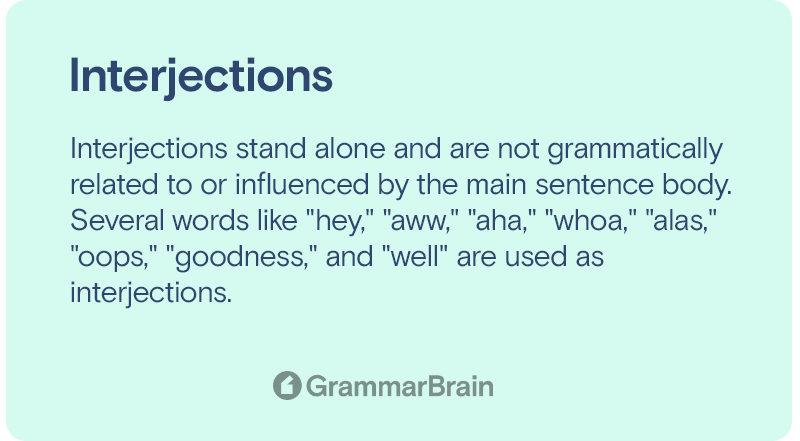
What are interjections?
Interjections stand alone and are not grammatically related to or influenced by the main sentence body. Several words like “hey,” “aww,” “aha,” “whoa,” “alas,” “oops,” “goodness,” and “well” are used as interjections.
Examples:
- Hey! Stop that right now.
- Aww! This dress is really beautiful.
- Aha! So this is where I left the package.
- Whoa! Slow down and start from the beginning.
- Alas! He is too weak to sit through this session.
Interjection: The different types
There are fundamentally two different kinds of interjection, and they are:
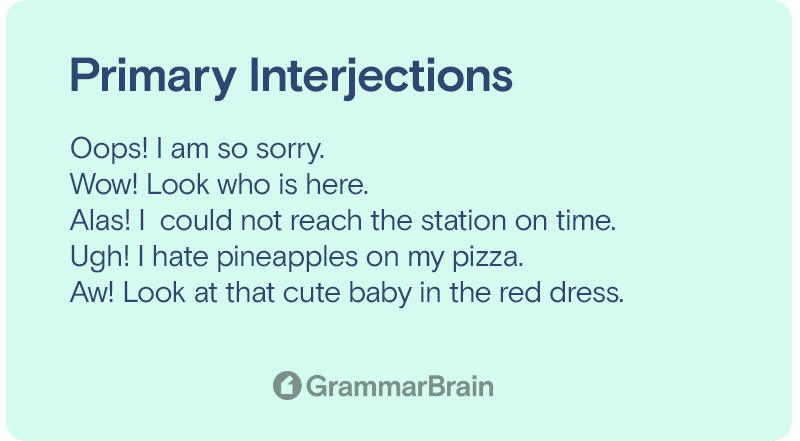
Primary interjection
These are individual sounds or words used in a sentence only as an interjection. They do not have any other uses or meanings. Primary interjection words include “wow”, “blah,” “oops,” “ugh,” “geez,” “gee,” “hurray,” “huh,” “alas,” “aw,” “oh,” “ouch,” “meh,” and “phew.”
Examples:
- Oops! I am so sorry.
- Wow! Look who is here.
- Alas! I could not reach the station on time.
- Ugh! I hate pineapples on my pizza.
- Aw! Look at that cute baby in the red dress.
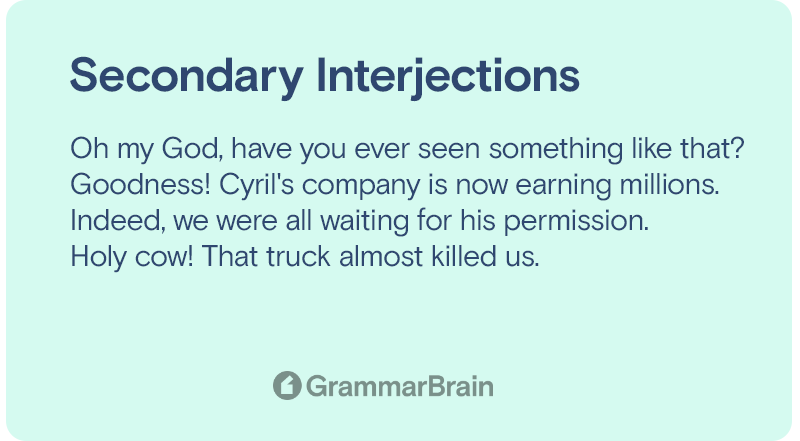
Secondary interjection
These are phrases or words that are already used as other parts of speech, like nouns or adjectives, and occasionally serve as interjections. Secondary interjection words include “oh my God,” “holy cow,” “indeed,” “awesome,” “goodness,” and “boy.”
Examples:
- Oh my God, have you ever seen something like that?
- Goodness! Cyril’s company is now earning millions.
- Indeed, we were all waiting for his permission.
- Holy cow! That truck almost got us.
- My dog destroyed my flatmate’s favorite pillow. Boy, was she mad!
Interjections can be divided into two groups depending on the intensity of the phrases:
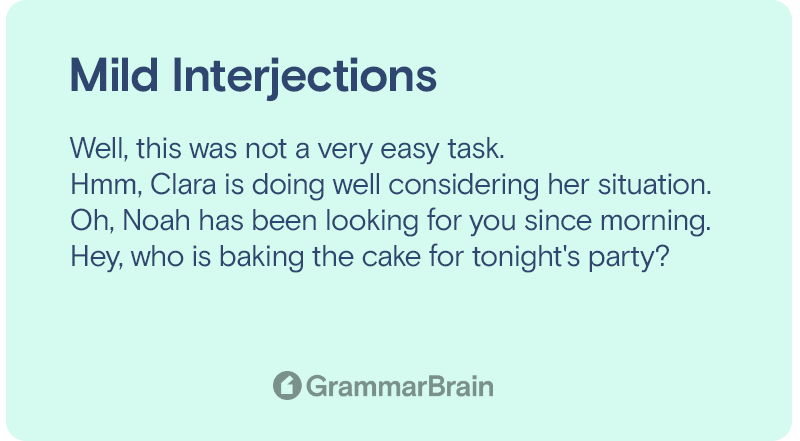
Mild interjection
These interjections either serve as opening expressions without any emotional connotation or convey relatively milder emotions. Commas are typically used to separate them from the main sentence body.
Examples:
- Well, this was not a very easy task.
- Hmm, Clara is doing well considering her situation.
- Oh, Noah has been looking for you since morning.
- Hey, who is baking the cake for tonight’s party?
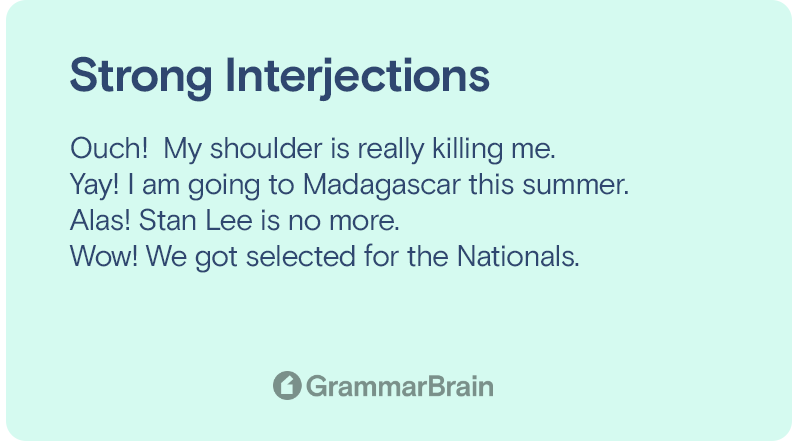
Strong interjection
Strong interjections are used to express powerful and solid emotions. Exclamation marks or points are typically used to separate them from the main sentence body.
Examples:
- Ouch! My shoulder is really killing me.
- Yay! I am going to Madagascar this summer.
- Alas! Stan Lee is no more.
- Wow! We got selected for the Nationals.
Interjections can be classified into three groups depending on the emotions they express:
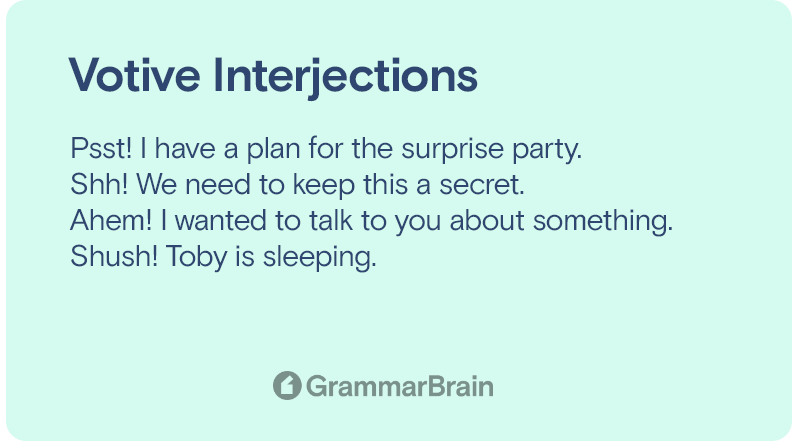
Volitive interjection
These interjections are frequently used to convey orders, wishes, and requests. They are used to replace expressions like “I want” in a sentence.
Examples:
- Psst! I have a plan for the surprise party.
- Shh! We need to keep this a secret.
- Ahem! I wanted to talk to you about something.
- Shush! Toby is sleeping.
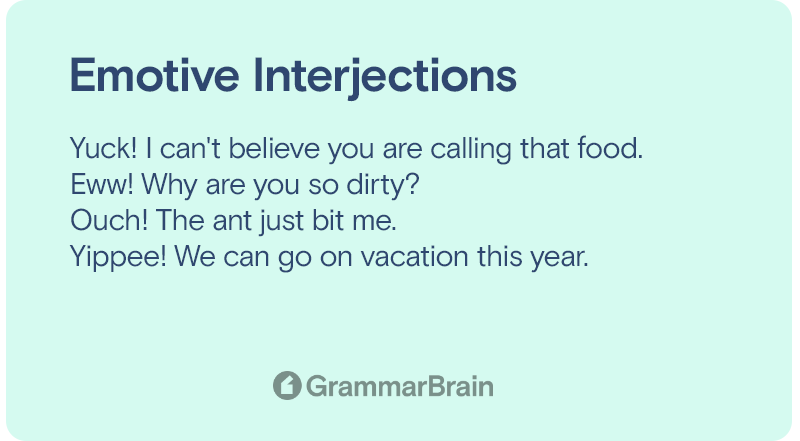
Emotive interjection
They are words or phrases that are used to convey sudden emotional outbursts like delight, surprise, disgust, fear, and sorrow. They are used to replace expressions like “I feel” in a sentence.
Examples:
- Yuck! I can’t believe you are calling that food.
- Eww! Why are you so dirty?
- Ouch! The ant just bit me.
- Yippee! We can go on vacation this year.
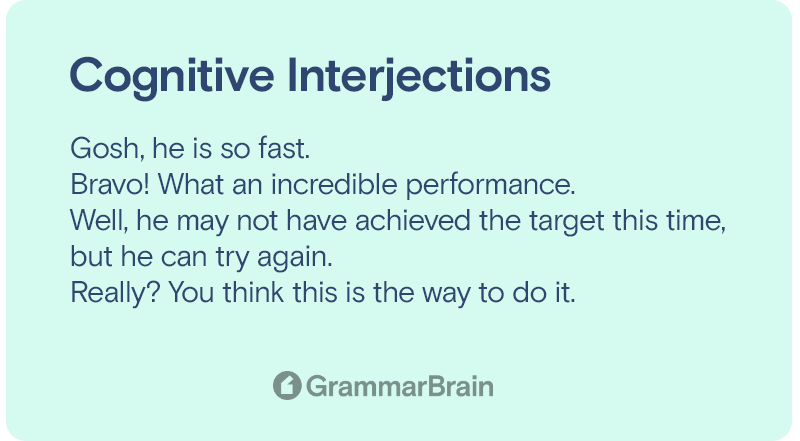
Cognitive interjection
Cognitive interjections are exclamation words or phrases that are derived from cognition. They are used typically to communicate the emotions and feelings individuals encounter and learn through experiences.
Examples:
- Gosh, he is so fast.
- Bravo! What an incredible performance.
- Well, he may not have achieved the target this time, but he can try again.
- Really? You think this is the way to do it.
Interjections can also be classified into different types based on the type of emotion they express.
- For joy
- For surprise
- For sorrow
- For attention
- For greeting
- For approval
- For annoyance, anger, frustration, or disappointment
FAQs
Should interjections be always placed at the beginning of a sentence?
Interjections are typically placed at the beginning of the sentence, but this is not a rigid rule. In some cases, they can also be placed at the end or middle of a sentence.
For example, an author or speaker can pose a question or query to the reader or listener by placing an interjection at the end of the sentence.
The sentence, “That is a really fascinating thought, hmm?” becomes a question when the interjection “hmm” is at the end. Similarly, interjections can be placed in the middle of a sentence to express doubt or uncertainty. An example is the sentence, “That is a really, hmm, fascinating thought.”
What are the punctuation rules for interjections?
Interjections do not adhere to standard English punctuation rules. Since they have no connection with the rest of the sentence, they are typically written independently and punctuated with a period or an exclamation mark.
Consider the sentence, “Oops! I am so sorry.” In this, the word “oops” can be used as a standalone word without the entire sentence and still make sense. Commas can also be used as punctuation after interjections.
Consider the sentence, “Oops, I dropped the vase.” Here, the interjection “oops” is separated using a comma. In some cases, punctuation is decided by the emotion or message expressed by the speaker. Typically, exclamation points are used to show strong emotions like excitement, sorrow, or surprise.
Where does the word “interjection” come from?
The word interjection in English actually precedes the use of the term interject. Similar to interrupt.
What are primary and secondary interjections?
Primary interjections are “oh, wow, oops” and secondary interjections are “darn” and “heck.” Emotive interjections are things like “ew” or “yuck.”
What are angry interjections?
These are swear words.
Does every interjection have an exclamation point?
No. Typically, these are interjections that are used to express emotion. Like, “Wow!” They don’t always need to end with an exclamation mark if the use expresses emotion. Someone could say, “wow.” With a period. Although, a write may use an exclamation mark with emotion words to add expression. Like, “Uh oh!”
Are interjections used in a formal writing?
Typically, they are not. Interjections are typically used to create a sudden or strong feeling for the reader. In scientific writing, for example, narrative style writing is avoided entirely.
Sources:
- Merriam Webster – interjection – Definition
- Wikipedia – Interjection
- Grammarly – Interjections in English Grammar–What Are They?
- EnglishClub – Interjections
Inside this article
Fact checked:
Content is rigorously reviewed by a team of qualified and experienced fact checkers. Fact checkers review articles for factual accuracy, relevance, and timeliness. Learn more.
Core lessons
Glossary
- Abstract Noun
- Accusative Case
- Anecdote
- Antonym
- Active Sentence
- Adverb
- Adjective
- Allegory
- Alliteration
- Adjective Clause
- Adjective Phrase
- Ampersand
- Anastrophe
- Adverbial Clause
- Appositive Phrase
- Clause
- Compound Adjective
- Complex Sentence
- Compound Words
- Compound Predicate
- Common Noun
- Comparative Adjective
- Comparative and Superlative
- Compound Noun
- Compound Subject
- Compound Sentence
- Copular Verb
- Collective Noun
- Colloquialism
- Conciseness
- Consonance
- Conditional
- Concrete Noun
- Conjunction
- Conjugation
- Conditional Sentence
- Comma Splice
- Correlative Conjunction
- Coordinating Conjunction
- Coordinate Adjective
- Cumulative Adjective
- Dative Case
- Determiner
- Declarative Sentence
- Declarative Statement
- Direct Object Pronoun
- Direct Object
- Diction
- Diphthong
- Dangling Modifier
- Demonstrative Pronoun
- Demonstrative Adjective
- Direct Characterization
- Definite Article
- Doublespeak
- False Dilemma Fallacy
- Future Perfect Progressive
- Future Simple
- Future Perfect Continuous
- Future Perfect
- First Conditional
- Irregular Adjective
- Irregular Verb
- Imperative Sentence
- Indefinite Article
- Intransitive Verb
- Introductory Phrase
- Indefinite Pronoun
- Indirect Characterization
- Interrogative Sentence
- Intensive Pronoun
- Inanimate Object
- Indefinite Tense
- Infinitive Phrase
- Interjection
- Intensifier
- Infinitive
- Indicative Mood
- Participle
- Parallelism
- Prepositional Phrase
- Past Simple Tense
- Past Continuous Tense
- Past Perfect Tense
- Past Progressive Tense
- Present Simple Tense
- Present Perfect Tense
- Personal Pronoun
- Personification
- Persuasive Writing
- Parallel Structure
- Phrasal Verb
- Predicate Adjective
- Predicate Nominative
- Phonetic Language
- Plural Noun
- Punctuation
- Punctuation Marks
- Preposition
- Preposition of Place
- Parts of Speech
- Possessive Adjective
- Possessive Determiner
- Possessive Case
- Possessive Noun
- Proper Adjective
- Proper Noun
- Present Participle
- Prefix
- Predicate



